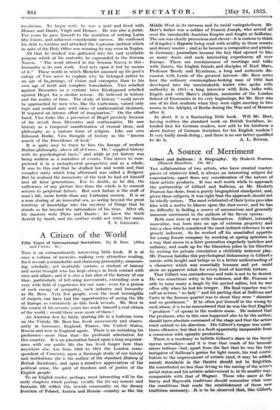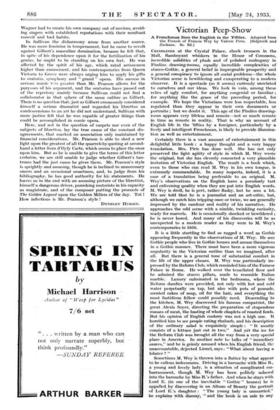A Source of Merriment
THE collaboration of two artists, who have created master- pieces of whatever kind, is always an interesting subject for examination, apart from any consideration of the nature of
their artistic products. It was well worth while to approach the partnership of Gilbert and Sullivan, as Mr. Hesketh
Pearson has done, from a purely biographical standpoint, and,
given these subjects, it was right that the approach should not be wholly serious. The most celebrated of their lyrics provides
him with a motto to blazon upon the dust-cover, and he has no difficulty in finding a source of unconscious and generally innocent merriment in the authors of the Savoy operas.
Both men were at-war with themselves. Gilbert, intensely masculine, was born into an age of extreme propriety and into a class which considered the most indirect reference to sex grossly indecent. So he worked off his unsatisfied appetite for young female company by mocking at ageing spinsters in a way that seems to a late generation singularly tasteless and unfunny, and made up for the blameless jokes in his librettos by writing for private circulation a childishly indecent play. Mr. Pearson handles this psychological disharmony in Gilbert's nature with insight and brings us to a better understanding of a character which was essentially humane and yet could show an apparent relish for every kind of horrible torture.
That Gilbert was cantankerous and rude is not to be denied. He was sometimes witty in his rudeness, and Mr. Pearson is able to raise many a laugh by his quoted sallies, but he was often silly when he lost his terrier. His final repartee was to call an actress " no ladY" and his parting shot at Sullivan and Carte in the famous quarrel was to shout they were " sheenies and no gentlemen." If he often put himself in the wrong by such abuse, it is to be remembered that he was the first English " producer " of operas in the modern sense. He insisted that the producer, who in this case happened also to be the author, should have absolute command of the stage and that the actors must submit to his direction. His Gilbert's _tongue was some- times offensive,: but that is a fault apparently inseparable from a connexion with operatic production.
There is a- tendency to belittle Gilbert's share in the Savoy operas nowadays—and it is true that much of his Immo* seems tedious—but, .apart from the fact that he was the true instigator of Sullivan's genius for light music, his real contri- bution to the improvement of artistic (and, it may be added,
moral) standards in the theatre should not be forgotten.
He contributed no less than Irving to the raising of the actor's social status and his artistic achievement is, in its smaller way, comparable with that of Wagner. Those who sneer at the Savoy and Bayreuth traditions should remember what were the conditions that made the establishment of those new traditions necessary,.._It.is .to observect that, like-Gilbert, Wagner had to create his own company out of_novices, avoid- ing singers with established reputations with their resultant conceit and bad habits.
In Sullivan the disharmony arose from another source. He was more feminine in temperament, but he came to revolt against Gilbert's masculine domination, because he felt that, in spite of his dependence upon it for the fertilization of his genius, he ought to be standing on his own feet. He was affected by the spirit of his age, which _rated seriousness
higher than amusement, and his contemporaries from Queen Victoria to Grove were always urging him to apply his gifts
to oratorio, symphony and " grand " opera. His success in serious music vas greater than Mr. Pearson allows for the purposes of his argument, and the oratorios have passed out of the repertory mainly because Sullivan could not find a collaborator in that sphere of the same calibre as Gilbert. There is no question that, just as Gilbert erroneously considered himself a serious dramatist and regarded his librettos as condescensions to an art he did not understand, Sullivan with more justice felt that he was capable of greater things than could be accomplished in comic opera.
Here, and not in the question of carpets nor even of the subjects of librettos, lay the true cause of the constant dis-
agreements, that marked an association only maintained by
financial considerations. Mr. Pearson is able to shed a new light upon the greatest of all the quarrels by quoting at second- hand a letter from d'Oyly Carte, which seems to place the onus
upon him. But as he is unable to give the terms of this letter verbatim, we are still unable to judge whether Gilbert's tan- trums had the just cause he gives them. Mr. Pearson's style is sprightly and amusing, though he is inclined to unnecessary sneers and an occasional smartness, and, to judge from his bibliography, he has good authority for his statements. He leaves us in the end with an amusing picture of the librettist, himself a dangerous driver, punishing motorists in his capacity as magistrate, and of the composer putting the proceeds of The Golden Legend upon the Golden Millers of the day. Tut ! How infectious is Mr. Pearson's style !
DYNELEY HUSSEY.















































 Previous page
Previous page